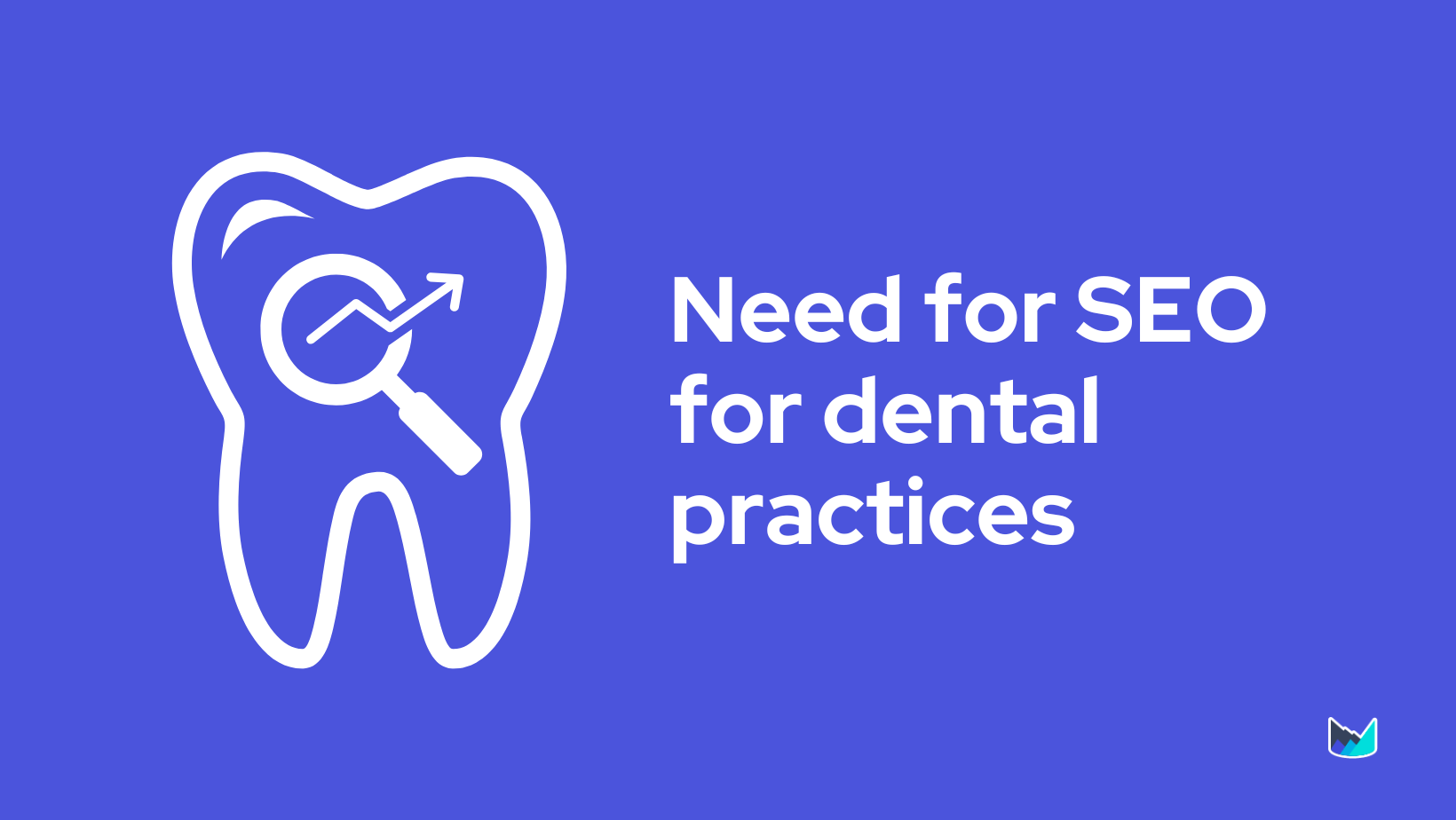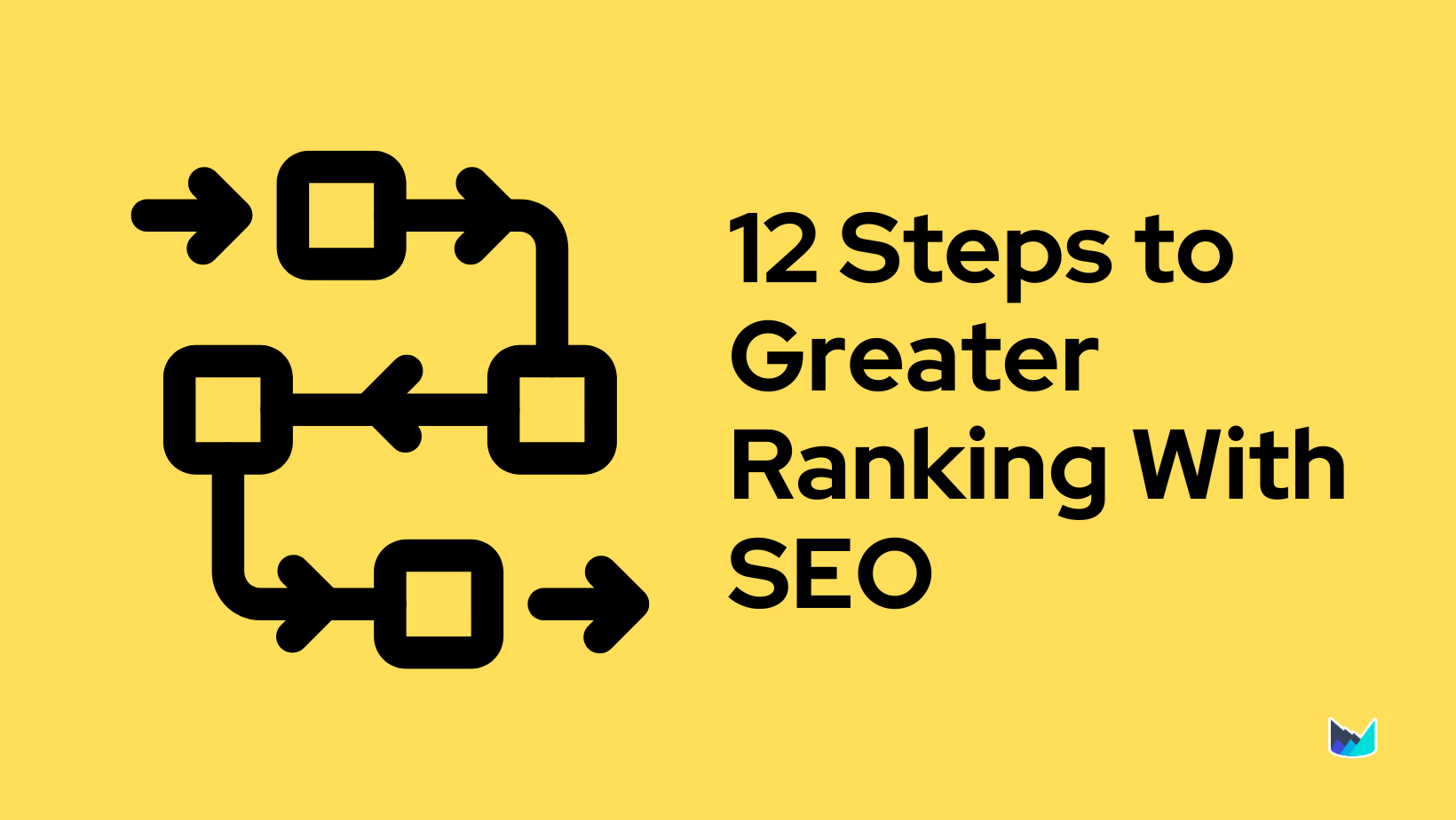- Product
- SEO Content Editor
- SEO Content Strategy
- Content Optimization
- Content Briefs
- AI Assisted Writing
- Keywords Clustering
Preview a demo walkthrough
Outranking the competition with our cutting-edge SEO strategies.
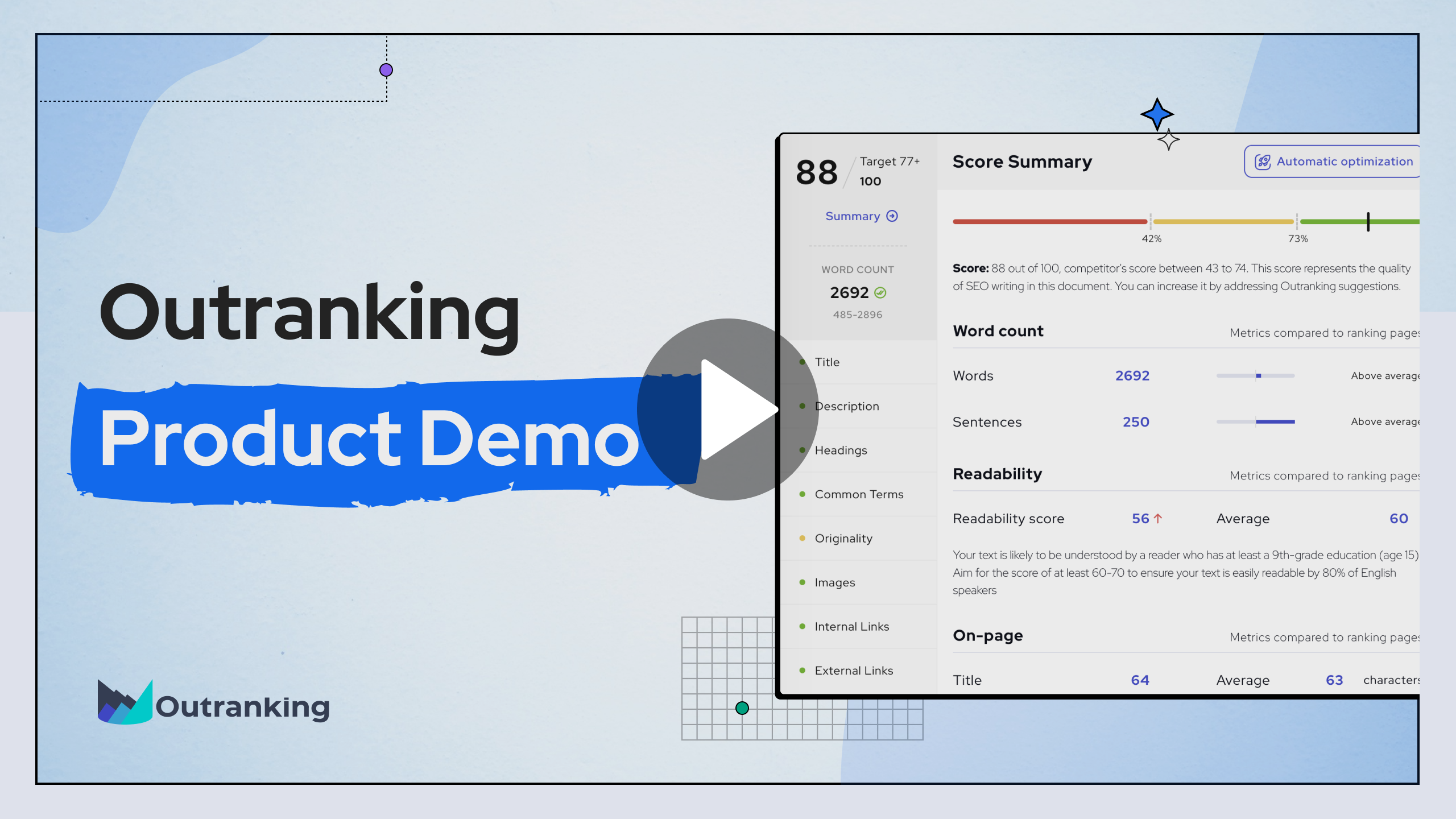
- Pricing
- Resources
- Sign In
- Get Started
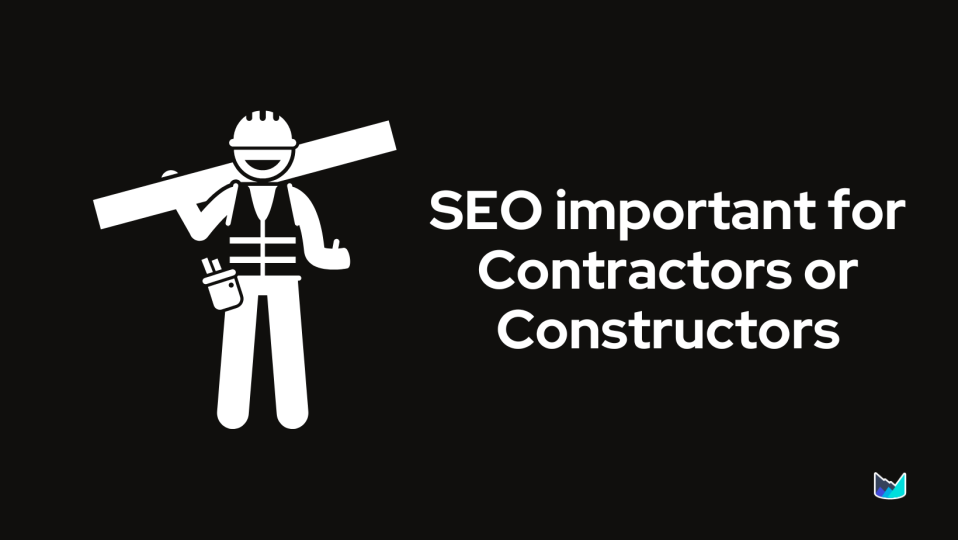
Table of Contents
Implementing SEO for a contractor or constructor services website is crucial for gaining visibility and attracting potential customers. On-page SEO optimization is a critical element for higher rankings on search rankings on search engines such as Google, Yahoo, and Bing. By optimizing the website’s HTML elements and including localized keywords, contractors can increase their chances of ranking higher in search results. Additionally, off-page factors such as website security, mobile-friendliness, quality backlinks, and user experience are also essential to reinforce the domain authority. In this article, we will provide tips on how to implement on-page SEO and optimize off-page factors to help contractors’ websites rank higher in search results.
Table of Contents
Why is SEO important for Contractors or Constructors
Search engine optimization (SEO) has become an essential technique in digital marketing that helps enhance online visibility and augment natural traffic to your website. The process of SEO includes enhancing your website and digital content to attain better rankings in search engine results pages (SERPs) when users look up relevant keywords. In this context, SEO is essential for contractors and constructors for several reasons.
- Impact on the online presence of contractors and constructors: By optimizing their website and online content, contractors and constructors can improve their visibility in search engine algorithms pages. This means that potential clients who are searching for construction services online are more likely to find their website and learn about their services.
- Impact on client acquisition for contractors and constructors: By creating informative and helpful content that is optimized for relevant keywords, contractors, and constructors can attract more website visitors who are interested in their services. These visitors are more likely to convert into clients or customers, which can ultimately lead to increased revenue and business success.
- Impact on the overall business success of contractors and constructors: By prioritizing SEO as part of their digital marketing strategy, contractors and constructors can allocate their time and resources more efficiently. This means that they can focus on creating high-quality content that is optimized for search engines, rather than wasting time on ineffective marketing tactics.
SEO KPIs for Contractors: How to Measure the Success of Your SEO Strategies
SEO helps contractors to rank higher in search engine results, making it easier for potential clients to find them. However, it’s not just about getting more traffic to your website. Contractors should also focus on specific SEO key performance indicators (KPIs) to measure the effectiveness of their SEO efforts.
One important KPI for contractors is client booking. By optimizing their website for local keywords and providing helpful content, contractors can attract more clients and increase the number of bookings they receive. Another KPI to consider is appointments. By making it easy for clients to schedule appointments online, contractors can improve their customer experience and increase their chances of securing new business.
Lastly, contractors should also focus on their position in Google Business. By claiming their Google Business listing and optimizing it with accurate information and reviews, contractors can improve their visibility in local search results. Overall, contractors should prioritize SEO and track their KPIs to ensure they are getting the most out of their online marketing efforts.
How to implement SEO for a contractor or constructor’s business website
If you’re a contractor or constructor looking to increase your online visibility and attract more potential customers, implementing SEO strategies on your website is a must. SEO, or search engine optimization, involves optimizing your website to rank higher on search engine results pages (SERPs) for specific keywords. By doing so, you can increase your website’s visibility to potential customers and ultimately drive more traffic to your site. In this article, we will provide you with a crash course on on-page SEO, keyword research, and other essential strategies to help your contractor or constructor’s business website rank higher on Google, Yahoo, and Bing.
- Step 1: Develop the website structure by segmenting it into fundamental services that your enterprise provides.
- Step 2: Create a record of keywords
- Step 3: Determine the topics to create by clustering keywords in each service area.
- Step 4: Create and update a Content Calendar and prioritize your business’s SEO efforts
- Step 5: Develop a method for creating content, create SOPs and SEO content briefs
- Step 6: Create SEO-optimized content for service pages and blogs
- Step 7: Optimize Internal Linking
- Step 8: Obtain links from other websites and local citations to boost the presence
- Step 9: Enhance the performance of your webpage’s loading time
- Step 10: Utilize Google Search Console
- Step 11: Optimize your Local Google My Business account
- Step 12: Invest in the right SEO tools to set up the structure, create a process, and optimize content
- Step 13: Direct your attention towards the end objective: acquiring leads and achieving conversions.
Step 1: Develop the website structure by segmenting it into fundamental services that your enterprise provides
The first step to implementing better SEO for a contractor or constructor’s business is understanding the business’s core areas. This involves identifying the key areas that connect most with the core offering of the business. By doing this, the business can develop a content plan that targets the right audience and improves its search engine rankings.
To deconstruct the website structure of either a contractor or a general contractor by identifying its fundamental services and additional subcategories., the business should identify the main services it provides. For example, a construction company may offer services such as the following:
- Commercial Construction
- Residential construction
- Remodeling
- Renovation.
Below is a table that lists the core service areas and its extended list of sub-areas for a contractor.
| Core Service Areas | Extended List of Sub-Areas |
| Commercial Construction | Building Design, Project Management, Site Preparation, Construction Materials, Structural Engineering, Electrical Engineering, Plumbing Engineering, HVAC Engineering |
| Residential Construction | Building Design, Project Management, Site Preparation, Construction Materials, Structural Engineering, Electrical Engineering, Plumbing Engineering, HVAC Engineering |
| Remodeling | Kitchen Remodeling, Bathroom Remodeling, Basement Remodeling, Home Additions, Flooring, Painting, Electrical Work, Plumbing |
| Renovation | Building Design, Project Management, Site Preparation, Construction Materials, Structural Engineering, Electrical Engineering, Plumbing Engineering, HVAC Engineering |
Step 2: Create a record of keywords
There are three essential factors to consider while conducting keyword research.:
- Gather the list of keywords in each of the core areas of your website.
- Eliminate irrelevant and outdated keywords to focus on the most important ones.
- Use a keyword research tool that you’re comfortable with and that gives you the data you need.
For a contractor or constructor business website, keyword research can be done using Semrush or Outranking. Here are the logical steps to do the keyword research:
- Using the above identified core areas we will build out the extended research for sub areas. For this example, we will choose “Remodeling” as the core area.
- Use Semrush or Outranking to generate a list of keywords for each core service area. For example, if the core service area is remodeling, use Semrush to search for keywords such as Kitchen Remodeling, Bathroom Remodeling, Basement Remodeling, and so on.
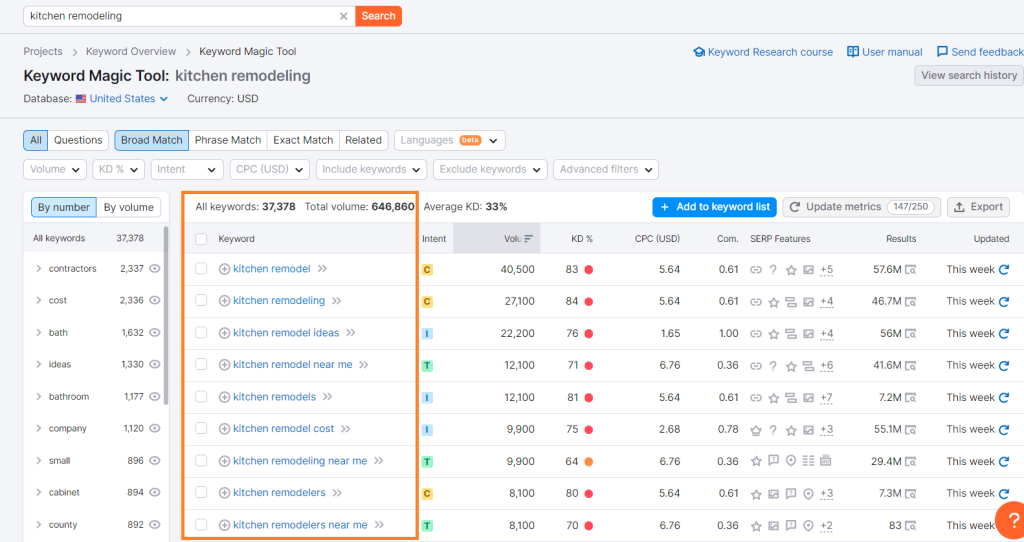
3. Exclude irrelevant and outdated keywords to focus on the most important ones. For example, exclude keywords that are not related to the core service area or that have low search volume.

4. Download the CSV file for each core service area and combine them into one file for easier management.
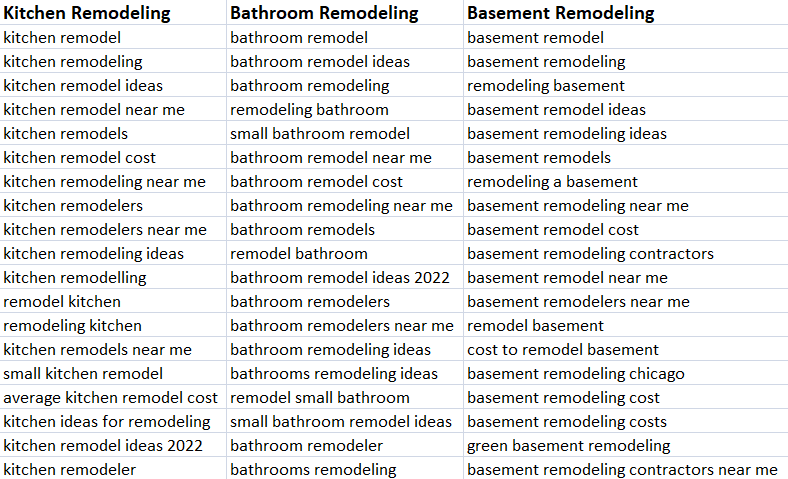
5. Repeat steps 2-4 for each sub-group within each core service area such as Home Additions, Flooring, Painting, Electrical Work, and Plumbing.
6. Move on to the next step of keyword analysis once keywords for each sub-group in a core service area are collected.
Step 3: Determine the topics to create by clustering keywords in each service area.
Keyword clustering is the process of grouping similar keywords into clusters based on their semantic terms and similar intent groups. This process helps to refine and streamline a website’s SEO content strategy by identifying the most beneficial keywords to target. A contractor or constructor business’s website should use keyword clustering to improve their website’s search engine ranking and increase traffic to their site.
For example:
A sample keyword list for a contractor or constructor business could include keywords such as “home renovations,” “kitchen remodeling,” “bathroom renovation,” “roof repair,” “deck building,” and “patio installation.” By clustering these keywords, the business can identify which keywords are most important to target and create a plan for new content around those keywords.

When selecting the main keyword for a cluster group, it’s important for businesses to take into account various factors. These may include their capacity to produce superior content compared to rivals, competitor backlink numbers, gaps in knowledge or areas of need within user intent and expertise on specific topics as well as shared SERP competitors.
By analyzing their competitors’ keyword coverage and minimum backlinks, the business can choose keywords that avoid their competitors wherever possible and have a better chance of ranking high.
A contractor or constructor business needs to hire someone who knows what they are doing if they don’t have an in-house SEO team because keyword clustering requires expertise and experience in SEO and marketing. A professional can help the business identify the best keywords to target, create a content strategy, and optimize their website for search engines.
Using a tool like Outranking for keyword clustering is also important because it simplifies and streamlines the process. Outranking’s clustering tool can analyze a large number of keywords and group them into semantic terms and similar intent groups, saving time and effort for the business. The tool also provides valuable insights into competitors’ keyword coverage and minimum backlinks, allowing the business to make informed decisions about its SEO content strategy.
Step 4: Create and update a Content Calendar and prioritize your business’s SEO efforts
To give importance to the key terms while generating and enhancing content for a contractor or constructor website, begin by compiling an inventory of primary keywords and related groups associated with your enterprise. To plan and schedule your content, use Outranking’s keyword strategy topics and planner page.
Prioritize your keywords based on business objectives.
Step 5: Develop a method for creating content, create SOPs and SEO content briefs
For a contractor or constructor business, implementing SEO can be a daunting task. However, having a well-defined process in place can make all the difference in ensuring the success of your strategy. To develop a comprehensive process for creating and optimizing content, consider these three tips from experts.:
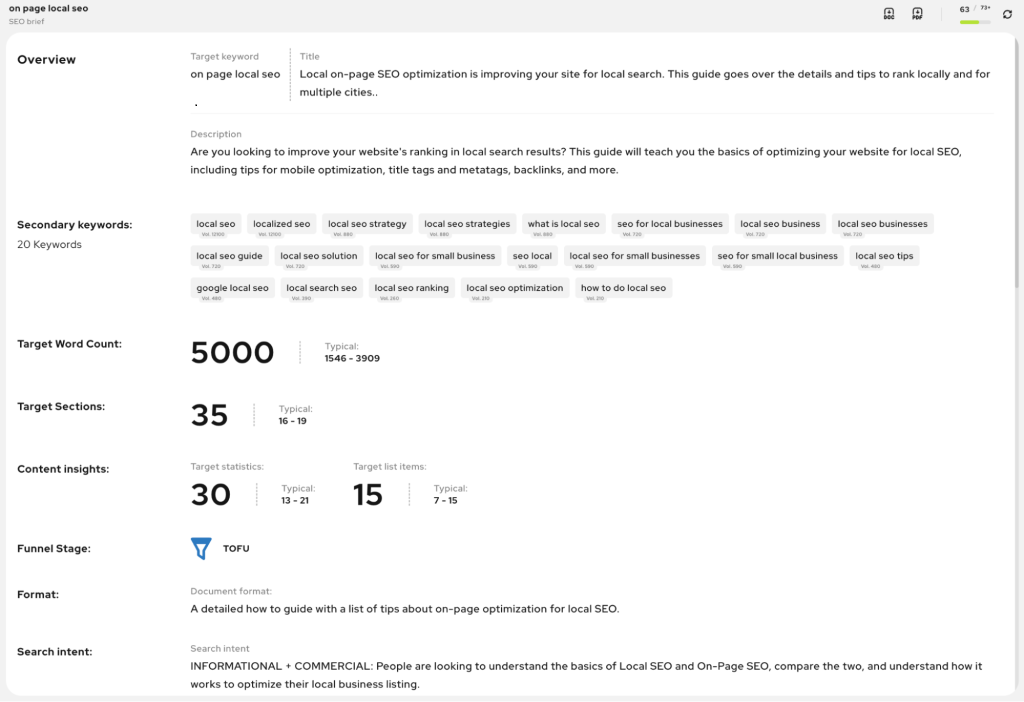
- Creating solid content briefs: Before creating any content, it’s essential to have a clear understanding of what you want to achieve with it. Creating a content brief will help you define your goals, target audience, and key messaging. This will not only ensure that your content is relevant and engaging but also help you measure its success.
- Setting up a proper content calendar: Creating a content calendar will help you stay organized and ensure that you are producing content consistently. It will also help you plan and ensure that your content is aligned with your business goals and seasonal trends.
- Setting up an SEO workflow for the tasks: Having a defined workflow for your content creation process will ensure that everyone involved knows what they need to do and when. This will help you stay on track and ensure that your content is delivered on time and to a high standard.
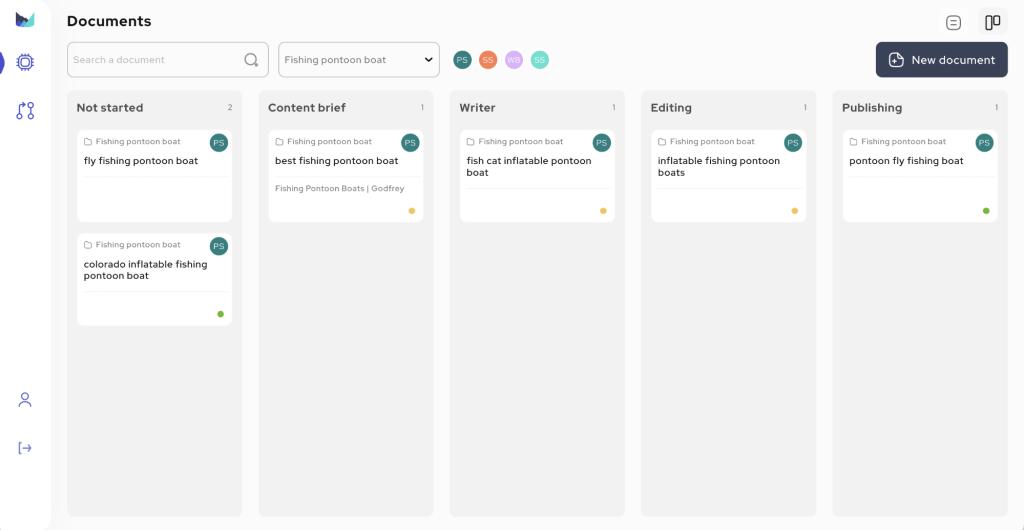
Using Outranking’s content planner can help you implement these tips and ensure the success of your SEO strategy. Outranking’s predefined workflow status and Kanban view will help you keep track of every document and see what stage they are in at a glance. You can also easily access any of your documents in no time at all using Outranking’s document view. By using Outranking’s integrated tool to either build SEO content briefs or create content directly in your SEO content strategy, you can stay organized and focused, ensuring your strategy is executed successfully.
If you are a busy contractor or constructor who may not have a lot of time to do this all yourself, but you would need to be involved for your expertise, it is recommended to hire an expert agency or Outranking to help you make this plan come to fruition for your business. They can help you create a customized SEO strategy that aligns with your business goals and ensure that it is executed successfully. With their expertise, you can focus on what you do best while they take care of the rest.
Step 6: Create SEO-optimized content for service pages and blogs
It is crucial for a contractor or construction business to spend money on creating SEO-optimized content for their service pages and blogs, as this ensures that the generated content will yield favorable outcomes. By optimizing your content, you can improve in the following aspects;
- Website’s search engine rankings
- Attract more organic traffic
- Generate more leads and sales
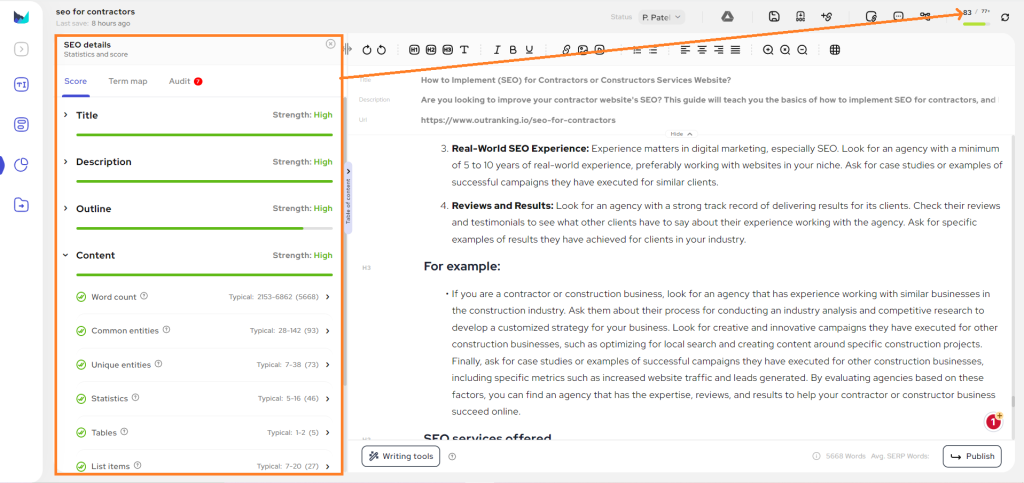
Outranking’s SEO content optimization and writing platform can help busy constructors who have limited time to write and optimize these pages to ensure the highest possible organic exposure. It has the following advanced features;
- Real-time optimization benchmarks
- Title tags
- SEO description optimization
- Outlines optimization,
- Word count optimization
- Competitor visualization
Step 7: Optimize Internal Linking
Optimizing existing pages with better internal linking can help improve the overall traffic of a website by borrowing the authority of pages that are already ranking and transferring some of it to the page that needs to rank better. This can be achieved by selecting pages that are ranking between 1 and 10, which are the pages in the top 4-14 positions. Clicks on the internal linking icon next to URLs with a lot of light and dark green, suggestions for internal linking will load, and users can pick the URL they want to get a link from and select Rewrite with an internal link.
For a construction company website, they should be looking to optimize pages that have keywords related to their services and products. For example, they can optimize pages with keywords such as “construction services,” “building materials,” “construction equipment,” “construction safety,” and so on. These pages should be ranked between 1 and 10 to ensure that they already have some authority and can transfer to other pages.
Outranking can connect to Google Search Console and identify pages that are ranking between 1 and 10 with keywords related to the construction company’s services and products. Outranking can then show internal linking opportunities by suggesting pages that can be linked to and the anchor text that should be used. This can help the construction company website identify the pages that need optimization and improve their overall traffic by borrowing authority from pages that are already ranking well.
Step 8: Obtain links from other websites and local citations.
Acquiring local citations and backlinks is crucial for the local SEO of a construction company’s website. Local citations can help search engines verify the existence, legitimacy, and trustworthiness of the business. If the same details appear across many relevant and trusted websites, then search engines like Google are more likely to have increased confidence that the business exists, is operational, and that what is said about it is true. Citations are the fifth most important ranking signal according to a survey by Moz for local queries.
Acquiring local citations can also help people discover the construction company online. People often turn to sites like Yelp, Yellow Pages, and specialist directories like Angie’s List to find local businesses. Business directories often dominate search results for local queries. Therefore, it is useful to get listed on these sites to increase the visibility of the construction company’s website.
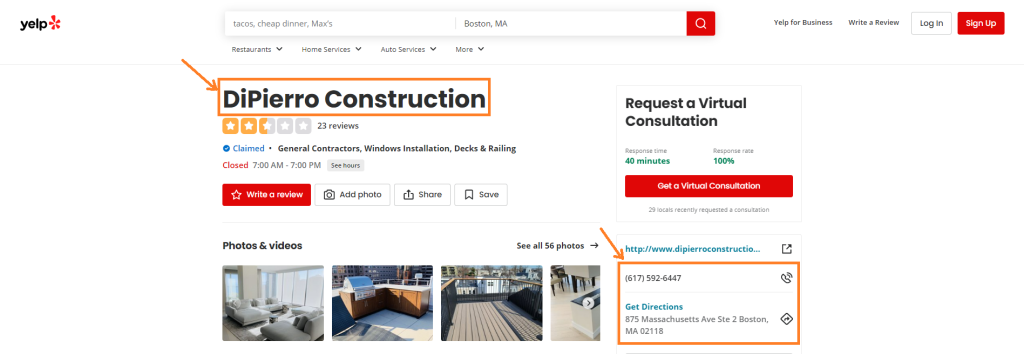
Structured and Unstructured are the two main types of citations;
- Examples of structured citations include directory listings and social media profiles, which provide the business’s NAP (name, address, and phone number) information.
- Contextual mentions of a business, also known as unstructured citations, are commonly found in blog posts, forum discussions, or press coverage.
To build citations, construction companies should follow these four steps:
- Make sure your business information is included in the top three data aggregators: The companies called Acxiom, Infogroup, and Localeze. The business information providers disseminate the company’s data to various online directories and search engines. Contracting firms can guarantee uniformity of their NAP details on multiple web platforms by enlisting with them.
- Submit to additional central platforms: Construction companies should submit their information to other core sites such as Google My Business, Bing Places, and Yahoo Local. These sites are essential for local SEO and can help businesses rank higher in search results.
- Share your content on various reputable industry and local websites that are widely accepted by the public: Construction companies should submit their information to popular industry and local sites such as HomeAdvisor, Houzz, and Angie’s List. These sites can help businesses reach their target audience and increase their online visibility.
- Make an effort to obtain citations that are not organized or arranged in a specific manner: Construction companies should also pursue unstructured citations by getting mentioned in blog posts, forum posts, or press mentions. These citations can help businesses build their online reputation and increase their authority in their industry.
According to a study by BrightLocal, businesses with more than 100 citations rank higher in local search results than those with fewer citations. Therefore, construction companies need to acquire as many relevant and high-quality citations as possible to improve their local SEO.
Here is a table with a list of data aggregators and websites that construction companies should get citations from:
| Data Aggregator | Websites to Get Citations From |
| Acxiom | Yelp, Yellow Pages, Superpages |
| Infogroup | Citysearch, Insider Pages, Local.com |
| Localeze | Foursquare, Bing Places, Yahoo Local |

Step 9: Enhance the performance of your webpage’s loading time and improve the user’s browsing experience.
A construction company needs to optimize its website’s homepage speed and user experience for better rankings in 2024 as it can lead to higher traffic, better engagement, and increased conversions. This can ultimately result in more business opportunities and revenue for the company.
To quickly optimize page speed and website experience, a construction company can use better and lighter themes such as the Constructor theme on Codecanyon and Nitropack-like WordPress plugins.
By optimizing these elements, a construction company can improve its website’s page speed and user experience, which can result in higher rankings, more traffic, and increased business opportunities.
Step 10: Utilize Google Search Console
It is essential for a construction company or contractor to establish a connection with Google Search Console and monitor their website’s ranking, in order to enhance their organic traffic and improve their online presence. By using the ranking data, they can optimize their existing content, find new opportunities to create fresh content, and identify underperforming pages that need improvement or redirection.
To interpret the website ranking data and take action, contractors or construction company owners can use the following table:
| Goal | Interpretation of Ranking Data | Action |
| Optimize Internal Linking | Pages with keywords in the top 4-14 positions | Improve internal linking structure to boost Pagerank |
| Build Topical Authority | Pages with no ranking keywords in the top 20 positions that don’t align with the user’s search intent | Create fresh content that aligns with the user’s search intent and target keywords |
| Improve Underperforming Pages | Pages with no ranking keywords in the top 20 positions that don’t align with the user’s search intent | Improve or redirect underperforming pages to boost overall website performance |
By using Google Search Console and tracking their website ranking data, contractors or construction company owners can improve their SEO content strategy, increase organic traffic, and ultimately attract more potential clients to their business.
Step 11: Optimize your Local Google My Business account
The free service, Google My Business, enables businesses to offer additional information about their business in search results such as images, videos, operating hours, and reservation services links.
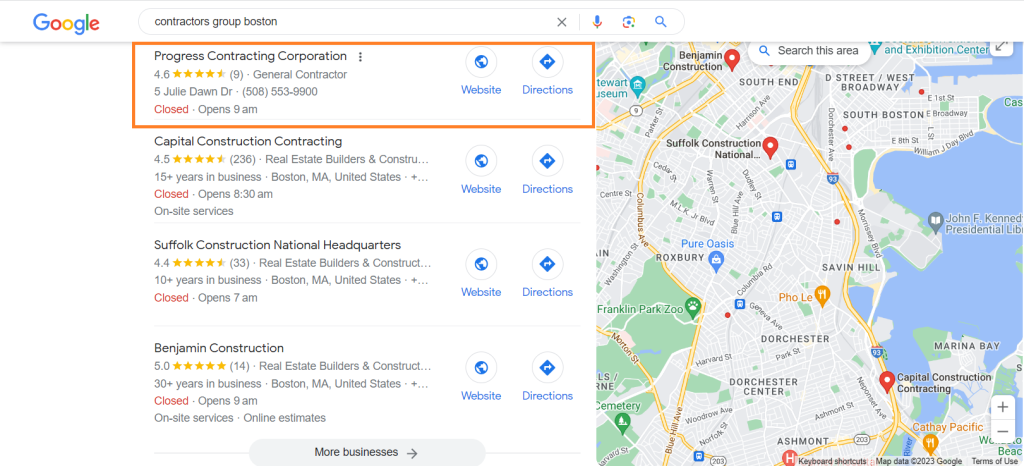
To optimize their listing for local search, contractors or constructors can create a Google My Business account, select the appropriate category, add a description, and verify their location. Here are some expert tips to improve their business listing:
- Use high-quality photos of completed projects to showcase your work and attract potential customers.
- Encourage customers to leave reviews on your Google My Business page to improve your local search rankings.
- Respond promptly to customer reviews, both positive and negative, to show that you value their feedback and are committed to providing excellent service.
- Use relevant keywords in your business description and throughout your listing to improve your SEO and help potential customers find you.
- Regularly updates your business information, including hours and contact information, to ensure accuracy and avoid frustrating potential customers.
Step 12: Create a process, optimize content, and invest in the right tools
Investing in the right tools, such as Outranking, is crucial for contractors or constructors looking to succeed with SEO. These tools streamline the entire SEO content strategy, including on-page optimization, by providing keyword research, content optimization, and performance tracking. With keyword suggestions, content optimization recommendations, and performance metrics, contractors or constructors can optimize their pages efficiently, resulting in higher search engine rankings and increased website traffic.
However, having the right tools is not enough. Having an appropriate team is crucial for contractors or builders in order to succeed. In order to attain objectives and generate excellent results, effective communication and teamwork among team members are indispensable. By setting clear goals, assigning specific responsibilities, and holding SEO team members accountable for their assigned tasks, contractors or constructors can ensure everyone is working together towards a common objective. This has the following advantages;
- Increases efficiency
- Produces better-quality content
- Creates a more cohesive team
Step 13: Direct your attention towards the end objective: acquiring leads and achieving conversions.
Most websites focus on organic traffic because it is a long-term strategy that can bring in consistent traffic without the need for paid advertisement. An example of a short-tailed keyword is “contractor” which can bring in lots of unrelated traffic, but a more specific keyword like “residential contractor in [city name]” can bring in a much more targeted audience for a contractor or constructor.
It’s important to focus on leads and conversion and not get distracted by a traffic mindset because ultimately, the goal of a website is to convert visitors into paying customers, not just to have high traffic numbers.
How to evaluate an agency to help with SEO for your contractor or constructor business
Specialized skills, evaluations, and outcomes
When evaluating an agency to help with SEO for your contractor or constructor business website, there are a few key factors to consider:
- A documented methodology and tailored strategy: Look for an agency that has a proven process and principles for performing website audits and search engine optimization, but also applies a customized approach tailored to your unique competitive position. Ask about their process and how they tailor their strategies to your specific industry and niche.
- Innovation and creative thinking: Top-notch SEO firms possess great creativity and ingenuity. Inquire about the innovative methodologies employed by the agency to set their clients apart from their rivals.. Look for examples of unique and successful SEO campaigns they have executed.
- Real-World SEO Experience: Experience matters in digital marketing, especially SEO. Look for an agency with a minimum of 5 to 10 years of real-world experience, preferably working with websites in your niche. Ask for case studies or examples of successful campaigns they have executed for similar clients.
- Reviews and Results: Look for an agency with a strong track record of delivering results for its clients. Check their reviews and testimonials to see what other clients have to say about their experience working with the agency. Ask for specific examples of results they have achieved for clients in your industry.
Services related to the optimization of search engine rankings are provided.
When evaluating an agency to help with SEO for your contractor or construction business’s website, there are a few key factors to consider:
- Proven Process and Customized Approach: Look for an agency that has a proven process and principles for performing website audits and SEO, but also offers a customized approach tailored to your unique competitive position. For example, the agency should perform industry analysis, competitive research, strategy design, implementation, and follow-up. However, the strategy design should be unique to your business.
- Creativity and Innovation: The agency should be highly creative and innovative in its approach to SEO. Ask for examples of unique strategies they’ve implemented to help their clients stand out in their industry. A cookie-cutter approach is far less effective than a customized and creative strategy.
- Real-World SEO Experience: Choose an agency with at least 5 to 10 years of real-world experience in SEO, preferably working with websites in the contractor or construction industry.
For a contractor or construction business website, it’s important to consider local SEO strategy matters. This includes optimizing for local keywords, creating local business search listings, and getting reviews from local customers. A good agency should have experience in implementing local SEO strategies.
Looking for an SEO expert?
If you’re a contractor looking to establish your online presence, it’s important to have a solid SEO plan in place. However, if you’re not well-versed in the intricacies of SEO, it can be overwhelming to try and figure it all out on your own. That’s where an SEO consultant can come in handy. By hiring an SEO consultant like Outranking, you can get expert advice on strategy, planning, and execution to ensure that everything goes smoothly and you get the right results. An SEO consultant can help you understand the ins and outs of SEO, from technical and on-page techniques to local SEO strategies. They can also help you identify the right keywords to target and optimize your content accordingly. With the help of an SEO consultant, you can ensure that your website is properly structured and optimized to reach the highest rankings in search results. So, before you hire an SEO agency, consider hiring an SEO consultant to ensure that you have a solid plan in place and know everything you need to know to make the most of your SEO efforts.


